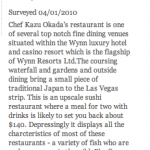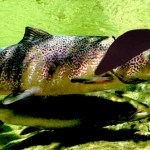Solutions
You know it's been a while when you've forgotten your log in information for your blog. My habitual apologies for the long silence. A lot has happened lately so let's get to it:
--CITES a Bust for Marine Life (Mar. 25): At the CITES meetings held in late March in Doha, there were winners and there were losers, except in the marine environment, where there were only losers. Opposition by Japan, China, and their allies led to the defeat of every proposal to give CITES protection to vulnerable marine species including hammerhead sharks, whitetip sharks, porbeagle sharks, spiny dogfish sharks…
The UN has rejected the proposal that Atlantic bluefin tuna be listed by the Convention on International Trade in Endangered Species, or CITES, which is currently in session.
CITES regulates the international trade of threatened species. All imports, exports and re-exports of species included in CITES must be authorized by a licensing system that is administered by the individual parties of the convention.
Japan, which imports 80 percent of Atlantic bluefin and has led the opposition to the ban, reiterated its arguments that CITES should have no role in regulating tuna and other marine…
Bluewashing, a phenomenon I first described in this article about Al Gore getting hammered for eating sea bass, has made it in Schott's Vocab at the New York Times. The confusion involved in seafood consumer campaigns was also recently highlighted by Marc -- Mental Masala at The Ethicurean and also by Frank Nelson at Miller-McCune. Nelson points out:
While the influence of consumers alone may be open to question, many believe such campaigns are a vital first step, seeding the idea of change and influencing those higher up the decision-making chain, such as restaurant chefs and wholesale…
So much of what the scientists do is less relevant than it could be. This was the motivation behind the theme at the 2010 AAAS annual meeting, Bridging Science and Society.
Our panel discussed non-regulatory means of enhancing cooperation - namely through reputation and shame. Ralf Sommerfeld, a recent graduate who worked with the Max Planck Institute, presented several of his new game theoretical studies showing that gossip and reputation can lead to increases in overall cooperation [1, 2]. This is the theory that underpinned my presentation proposing that we migrate away from guilt-based…
Vertical agitation meets shame in Fish2Fork, a new seafood conservation effort led by Charles Clover (author of End of the Line), which seeks to highlight which restaurants are best and worst when it comes to the seafood they sell. The focus on restaurants is a great move and I particularly like how Fish2Fork highlights the 'top 10' and 'bottom 10' restaurants.
As a quibble, I wish the "We say..." bit on Fish2Fork was a little less whimsical and the main reasons for the negative (or positive) rating were right up top. For instance, Okada, a sushi restaurant in Las Vegas, sells bluefin tuna…
To make a real difference, we're going to have to change patterns of consumption at levels higher than just households. This vertical agitation can take lots of different forms, but I want to highlight some of the great work being done academically and on the ground. Last year, an article in the International Zoo Yearbook by Heather Koldewey and two colleagues pointed out that zoos and aquariums should be leading the way in the push for sustainable seafood. Indeed, as the authors, point out, some already are.
Chicago's Shedd Aquarium, for instance, has teamed up with a culinary school to…
According to some recent news sources, Somali piracy seems to have scared away foreign fishing vessels and have led to increased fish catches off northern Kenya.
Some scientists working in the region disagree with the piracy hypothesis, though, saying the increased catches have more to do with environmental changes associated with warmer waters that shifted to East Africa around the time of the reported catches.
Even if the piracy story is not true, it should be true. During WWII, when fishing boats and their crews were needed for the military rather than seafood markets, fishing after the…
Need a New Year's resolution? Consider signing this seafood boycott.
It's that time of year where we welcome changes and commitment to ideals. New gym memberships. Re-committing to flossing every day. Giving up seafood...
My New Year's resolution was to finally write this blogpost compile a list of people that will boycott seafood (all farmed and wild caught marine and freshwater animals) for 2010 to:
1.demonstrate serious admonition for current fisheries practices (on the whole; we know there are a few localized examples of good management);
2.demonstrate strong support for seafood…
As part of an ideas series for 2010 at The Tyee, I wrote a piece on vertical agitation -- the idea that to make a real difference, you need to go straight to the top. Here are the first two paragraphs:
People who buy green products can apparently more easily justify subsequent greed, lying and stealing. A study, released earlier this year by researchers from the University of Toronto, showed that participants who were exposed to green products in a computer-simulated grocery store acted more generously in experiments that followed, but that participants who actually purchased green products…
Maya Lin, the architect behind the Vietnam memorial in Washington D.C. among other endeavors, thought she would not be making any more memorials. But her latest and last memorial focuses on the loss of biodiversity using animal sounds and is called "What is missing?". The interactive project is newly installed at the California Academy of Sciences and is designed to show us what we've lost and what we stand to lose. Listen to her talking about her listening cones as a wake up call for humanity, which will be installed in many science museums around the world, at On Point at NPR. Keep a…
Oliver Morton wrote a delightful book all about photosynthesis called Eating the Sun: How Plants Power the Planet, which I reviewed earlier this year for Search Magazine (R.I.P.) under the title "A Song for the Heartless". One of my favorite passages in the book beautifully explains the difference between art and science:
Discoveries feel determined. They are there to be made, and if one person doesn't, another will. This doesn't lessen the achievement; indeed it can give it spice. The thought that 'this is the way the world is--and I am the first to see it as such' is an intoxicating…
What if you could gamble for a good cause? Why not build a casino where the profits go to conservation?
The idea came to me last night while watching a BBC documentary on gambling with Louis Theroux (see preview below). The segment features a woman who has lost $4 million over the last 7 years (don't worry, she says she had fun doing it) and a Canadian mattress man who lost somewhere over $250,000 in one weekend. Imagine if these people could lose their money and know that it ultimately wound up going toward a good cause rather than in the pockets of already rich casino owners?
Yes, some…
It's no secret: I voted for Obama. I did a lot more than that. I called the 'Impeach Obama' bluff. I begged him to give up fish, although I don't think he has yet.
I guess giving up seafood can wait. This month, President Obama gave me a harder pill to swallow. As many of you know, the Obama administration announced this month we could expect no additional marine reserves. California is still pushing their reserve designations with their MPAs work campaign, even if recreational fishers are unhappy. Others are rallying support for a National Ocean Policy.
Now I know Obama is a man of…
Myopic spot-prawn lovers might not like the idea of closing some of the oceans to fishing, but California is creating a network of marine protected areas (MPAs) along its coast for one simple reason -- MPAs work. Research by Callum Roberts et al. (2001) published in Science found:
a network of five small reserves in St. Lucia increased adjacent catches of artisanal fishers by between 46 and 90%, depending on the type of gear the fishers used. In Florida, reserve zones in the Merritt Island National Wildlife Refuge have supplied increasing numbers of world record-sized fish to adjacent…
In North America, we have thick plastic yogurt containers (come to think of it, we have thick yogurt, too) that one could use over and over and over again (except almost no one does). I don't understand why we don't do it like they do in the UK, where they have these really thin plastic containers that are sheathed with cardboard labels. It seems to me that there is overall less waste and both container and label can be recycled.
There is a reason people are pushing for increased marine protected areas (which currently protect less than 0.1% -- yes, that decimal place is supposed to be there -- of our ocean from fishing). MPAs work. That's why in California they passed legislation ten years ago to create an underwater national park system. Now, finally, the project is underway. But not without some contention. Some fishermen are not too happy about closing areas to their industry. But spot prawn lovers are also sulking.
In the LA Weekly, a food blogger wrote this lede:
Your favorite Santa Barbara spot prawn dish…
I know it sounds a bit like the Onion headline "New Starbucks Opens In Rest Room Of Existing Starbucks" but it's true: after more than a century of absence, scientists recently discovered wild young Atlantic salmon in New York's Salmon River. The Salmon River, as its name implies, once hosted an abundance of Salmo salar but by the late 1800's, Atlantic salmon disappeared due to usual set of anthropogenic culprits: damming of tributaries, overfishing, deforestation, and pollution. Of course, this wild fish is the spawn of a repatriation project using hatchery-reared yearlings, but it's…
I don't know if there is actually a new focus on ocean conservation, as is declared by the New York Times Green Inc. blog title (but not really the post), or if we just want there to be (I know I do). And while it might be true that "the most growth in protected areas has occurred in the ocean" -- at less than 1% of the ocean closed to fishing, we still have a long way to go to meet the goal of having at least 10% of each of the world's ecological regions effectively conserved by 2010 as outlined by the Convention on Biological Diversity (interestingly, the Christian Book Distributors…
Many thanks to Mike HIrshfield at Oceana for sending along this little piece of good news: Atlantic salmon have returned to the Seine River. After having disappeared for nearly a century due to dams, overfishing, and pollution, hundreds of Atlantic salmon are swimming past the Eiffel Tower this year. The reason? Scientists say it's simple: cleaner water.
Bonjour! Salmon are back in the Seine...
The End of the Line, a documentary on global overfishing sparked by Charles Clover's book by the same title, has sparked many public conversations about global overfishing.
The latest discussion takes place today at SEED magazine, where several fisheries experts (many of them make appearances in the film) gave their impressions of the problem. I also provided a few recommendations: deal with pigs and chickens, eat local and leave seafood for survival, consider a seafood boycott, and agitate vertically rather than laterally.



